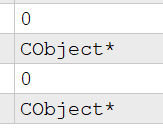typename
Thanks, but same issue - just get the CObject pointer type.
I think typename is used when using templates; but since you are using straight inheritance, you are just getting the type of the CObject* pointer.
Try const override.
class SubType : public CObject { public: virtual int Type() const override { return 1; } };
Thanks, but same issue - just get the CObject pointer type.
Sorry I read and answered too quickly.
Anthony is right.
I think typename is used when using templates; but since you are using straight inheritance, you are just getting the type of the CObject* pointer.
Try const override.
Thank you, that fixed it - because the Type() method on the CObject base class is declared "const", the SubType version - which originally wasn't marked as "const" - wasn't overriding it. The desired result is also produced whilst omitting the "override" keyword on the SubType override - I presume you add this for compiler sanity check, that you are actually overriding what you think you are?
Cheers
- en.cppreference.com
Thank you, that fixed it - because the Type() method on the CObject base class is declared "const", the SubType version - which originally wasn't marked as "const" - wasn't overriding it. The desired result is also produced whilst omitting the "override" keyword on the SubType override - I presume you add this for compiler sanity check, that you are actually overriding what you think you are?
Cheers
exactly. In other cases it is sometimes necessary to use dynamic_cast
for(int i=0;i<list.Total();i++) { MyObj *obj = dynamic_cast<MyObj*>(list.At(i)); if(!CheckPointer(obj)) continue; ... }
- Free trading apps
- Over 8,000 signals for copying
- Economic news for exploring financial markets
You agree to website policy and terms of use

The collection classes in the standard library allow us to, for example, create a list of objects which all inherit from CObject.
Obviously, this is useful because it allows us to store different types of object in the same list.
However, when one is subsequently working with the contents of the list, it is useful to be able to check at runtime what the actual subtype of the objects are, so you can branch accordingly. How is this done? I've tried overriding the Type() method on CObject for the subtype, but when calling this method it executes in the context of CObject.
Example:
Prints:
0
0
instead of the expected
0
1
What am I doing wrong here, and how can I achieve the desired result?
Many thanks